- Home
- Nevil Shute
Stephen Morris and Pilotage Page 13
Stephen Morris and Pilotage Read online
Page 13
He sipped his drink and stretched out one hand to the blaze, dreaming.
He looked at his hand, curiously, sleepily. He was not sorry he had done it. It had been the right thing to do … and it was over now. Because he had faced it, it had not lasted so long. God, how quickly he had got on! He had had most amazing luck all through his life; luck in getting to know his girl, luck in getting in touch with poor old Malcolm, luck in getting on to Rawdon, luck in sticking with the company over the bad times. He had done in nineteen months what he thought would have taken him four years.
There was a stir behind him, and the door opened and shut. Somebody – two people – had come in and were taking off their coats in silence. Morris did not look round. He was tired, sleepy with the warmth, too tired to stir. He must get on to Oxford for dinner. Or, why not stay and dine here, and go on to Oxford afterwards?
Somebody, a man, was coming up behind him to the fire, rubbing his hands to the blaze. Morris stirred a little in his chair and turned to look at the newcomer.
‘Why, Christie,’ he said quietly. ‘I thought you were in the Argentine.’
‘Hullo, Morris,’ said Christie in his slow way. ‘When on earth did you drop in? I am most awfully glad to see you.’
Morris stirred a little further in his chair, produced a pouch of tobacco, and tossed it on the table towards the other. ‘The same stuff,’ he said laconically. ‘You’re quite sure you aren’t still in the Argentine?’
Christie chuckled gravely, picked up the pouch, and began to fill his pipe. A slim, fair girl, whose face seemed vaguely familiar to Morris came and stood beside Christie.
‘My wife,’ said Christie.
Morris got up and shook hands, smiling. ‘I had no idea of this,’ he said apologetically.
The girl laughed cheerfully. ‘It’s recent,’ said Christie, ‘– too recent for gossip. Three days, to be exact.’ He turned to the girl. ‘He lives on gossip, this man.’
‘I know where he learned that,’ said the girl. She turned to Morris. ‘I remember you,’ she said. ‘I often saw you in the “Cadena” in the mornings – with Robert.’
So Christie was also Robert. Morris remembered the look of the girl; he thought she had been a home student.
Presently she disappeared upstairs. Christie took a chair, and lit his pipe. ‘The advantage of regular habits,’ he said reflectively. ‘One always knows where to go for good tobacco. Where are you making for now? Oxford? Better stop and have dinner with us here.’
‘I thought of having dinner here,’ said Morris. ‘I’m going first to Oxford – I don’t know what after that. See what happens in Oxford. Gloucester perhaps.’
There was a pause while Christie filed and docketed this information, then, ‘What are you going to Gloucester for?’ he asked. ‘Got business there?’ It was a crude inquiry. Christie knew as well as anyone. The effort to recall the details of a six-months’-old consternation proved detrimental to his tact.
Morris did not answer the question directly. He took up the old, worn poker, and scraped a little white ash from the bars of the brazier. ‘One moves on,’ he said. ‘You’ve moved on – you’ve gone and got yourself married. Wallace seems to be falling into the arms of one particular divinity. You know pretty well as much about my affairs as I do. Do you suppose I stand still?’
‘And so you’re going to Gloucester,’ said Christie.
‘By heavens, Holmes – this is marvellous!’ Morris leaned forward to the fire and began to talk. He told Christie what he had been doing since he left Oxford, what he had done before he left Oxford. He told his tale straight ahead, almost as if he had been telling it to a child at bed-time, making it up as he went along. Christie listened imperturbably to the end.
‘She doesn’t know you’re coming?’ he said at last.
Morris shook his head.
Christie routed in his pocket for a match, leaned forward, and lit his pipe again. He blew a long cloud of smoke which, caught by a draught, vanished up the great chimney.
‘Morris,’ he said, looking into the embers. Morris looked up. ‘Morris, I’m afraid she’s married.’
The coals fell together with a tiny crash in the brazier.
‘Oh,’ said Morris softly.
‘I’ll tell you what I know,’ said Christie.
‘I’d like to hear that,’ murmured Morris, very gently. The blood was slowly returning to his heart.
‘I saw it in the Tatler, or one of those papers – last autumn. It was a photograph of her as an engaged girl. It was headed – “An autumn wedding” – or something like that; you know the kind of thing. It said she was going to be married next month to Lechlane – you remember Lechlane.’
‘He came into money,’ said Morris. ‘He was a sort of cousin of hers – distant.’
He sat scraping the ash interminably from the brazier. Presently he got up from his chair and stood before the fire, looking down into the coals, one hand on the mantelpiece. Christie, as he watched him, seemed suddenly to see him as he would be in thirty years’ time, the same, but different; a little greyer, a little graver. He moved and stood upright; the illusion vanished. ‘Thanks for telling me that,’ he said. ‘It was good of you. Otherwise I might have made a fool of myself.’ He turned from the fireplace. ‘I must get on. You’ll remember me to your wife?’
He took his coat, the new ulster bought only that morning, and put it on.
‘You won’t stay for dinner?’ asked Christie.
‘I don’t think so, thanks,’ said Morris a little pathetically. ‘I want to get on.’
Christie did not attempt further to detain him. He walked with him to the door.
‘We shall be here for a week longer,’ he said. ‘We’d be most awfully glad if you’d come in for a night or two – on your way back, if you happen to be passing.’
‘That’s damn good of you,’ said a voice from the darkness, ‘but I don’t suppose I shall. Cheer oh.’
The headlights flicked on; the engine of the little car purred suddenly, and the car slid away up the road. Christie watched it out of sight; three times there was a crescendo of noise, and then a sudden rumble, gradually increasing in note. The red star of the tail-lamp seemed to fly up the lighted road.
Morris was making that car move.
The barmaid touched Christie on the arm. ‘That gentleman hasn’t gone, has he? He hasn’t paid for his whisky!’
Five miles up the road Morris dropped one hand from the wheel and gathered the rug closer round him. He had not stirred since his hand returned from the gear lever; he had been getting colder and colder. Then it struck him that it was silly to sit there getting cold like that. He had quite enough to worry about without double pneumonia.
He buttoned up the collar of his coat and pulled the rug up round his middle. As he tucked it around him, his foot went down hard upon the accelerator; the car leaped fiercely forward. Well, let it! He had been making a fool of himself ever since he left Oxford; let him now make the final folly and finish up in the ditch! He was no good. All these years he had deluded himself – he had had no shadow of grounds for hope. He saw that clearly now.
But that was no reason for blinding through Tetsworth, scaring all the villagers out of their wits. He slowed a little and passed through the village, cheery with its lighted windows.
He pressed on his way, hurriedly, feverishly. There was no object now in his visit to Oxford, no reason to go there, nothing to do when he got there. But he must go somewhere, somewhere where he could find something to interest him, someone to talk to. He shrank from going back to Christie on his honeymoon, though he was the sort of man he wanted. He wanted to find company … somebody to talk to and go about with till he could go back to Southall and face his loneliness again.
He pressed on, and began to run down a long hill in the darkness. There was a turn at the bottom, he remembered, where one passed under a railway bridge; one must not come on that too fast. He peered forward, straining his eyes for th
e first appearance of it. There it was – he was on it, through it, and out the other side.
On past the road to Thame that struck off by the railway bridge, on over the bridge spanning the river. He was nearly at Oxford – it was not far now. He must have moved over this bit of ground. But one must do something, one must keep moving. Because if one did not keep moving, one would not be able to retain one’s self-control, and that was all one had left.
Then he was at the fork of the road outside Wheatley, and went spinning up the hill to the right under the overhanging trees. Past the little town in the valley beside him, and on towards Headington. He was tired. He did not want to eat, but he would have dinner somewhere; it would do him good. He must look after himself now, must be very, very careful of himself. It was all he had to do.
He entered the long tunnel of Headington Hill and ran down into Oxford, through the outskirts of the town, out on to Cowley Plain and Magdalen Bridge. He drove quietly on up the High.
He was cold, tired and cold. He must have something to eat somewhere … he would go to the George Grill. And after that, he did not know. He might go round to college and find out if there were any of his old friends about. It was all so unutterably dreary.
He drew up before the George and sat down in the grill to wait for his solitary meal. Beside him a group of undergraduates were dining not wisely but too well, and reading aloud the snappier passages from The Pink ’Un. Morris gathered that there had been a regrettable outbreak of lechery in the university, until the authorities had bestirred themselves, and caught a lecher and sent him down. Morris smiled; a dry humour reasserted itself in him; he felt that he could have made a creditable contribution to such an academic discussion. But presently his neighbours finished their meal and drifted away, and Morris was left to himself in the deserted room.
He finished his dinner and strolled out into the street. He must get on the road again, keep moving, tire himself out, so that when the time came, he could sleep quietly. He started up the car, wrapped himself up warmly again, and moved forward. He would just go straight ahead the way the car was pointing, down George Street and out into the country past the stations and on. That was westwards; he might go on tomorrow down to Cornwall for a little. He might make a night of it – he had plenty of petrol. He might get most of the way to Cornwall before dawn. One must keep moving.
He slipped out under the railway bridge and on down the long dull road to Botley. He did not understand this business, and he had nobody that he could consult. If only Malcolm had lived! But there was nobody. He could not understand about Lechlane; he could not imagine Helen, the Helen that he knew, being happy in that marriage. It all wound itself into his philosophy of life, worrying and rankling. Did things always happen like this? He had always held that the average human being was a pretty good sort – that things mostly worked out all right in the end.
What if he had been wrong – a fool?
He pressed on past the turning to Cumnor and on round by Wytham Woods, the hill looming faintly on his right in the darkness. He did not understand it, and he supposed that now he never would. He drove over the bridge before Eynsham and stopped at the lighted toll-gate, fumbling for coppers.
‘Are you coming back tonight?’ asked the girl.
Morris shook his head.
On through the main street of the village and out into the country again. He was on the road to Witney; he knew it well. It was a good road this, clear and easy and pleasant enough in daylight, past farm and wood now dimly illumined by his lamps as he passed. He was getting a little cold again, weary and dispirited. Perhaps things always came out this way really, only he had shut his eyes to it. There was an end to everything, to all illusion. Things faded, the bright colours did not last. Riley …
He breasted the hill outside Witney and ran down into the little grey town. To the left at the cross-roads and on over the bridge, on through the long main street to the other end of the town. Cheerful lights shone out of the windows; a stream of light, smoke, and laughter came from the door of one little pub. But he must get on.
He took the road to the right at the end of the town and made for Burford.
On out of the town, up the hill, and along the high plateau at the top past the derelict aerodrome, ghostly and desolate and painfully reminiscent of the Isle of Wight. Well, that remained, the work he loved, the designing business that meant so much to him. That was a clean, healthy, unemotional thing; something that lasted, that was permanent. The strength of the wings, the delicate, beautiful strength.
He was very tired; tired, cold and numb; he could not think clearly any longer. But he must go on, must keep his course, all night if necessary. He was numb, but he could not sleep yet; he must go right on wherever this might lead him.
But this was not the road to Cornwall he was on.
He passed by Burford in the valley below him. If he was going to Cornwall he should be farther south … there was a road through Newbury or somewhere that he ought to be on. He was twenty, thirty miles too far north. He would have to make a big detour later on – he would have to turn off somewhere.
He was going to Cheltenham, to Gloucester. He would have to turn off in Gloucester and head south for a bit.
He had not cared which way he went when he left Oxford; he had come this way at random. But it was all wrong; he must go on with it now, but it would bring him close, too close, to Bevil Crossways. He must not stop there, or anywhere else in Gloucestershire. He must show them that he could stick a thing like this out without squealing. He would carry on and make for Bristol or somewhere and put up there for the night. There would be all-night hotels in Bristol. And by the time he got there perhaps he would be able to sleep.
He pressed on over the wide, open, treeless country. The moon was bright now; he could see the country almost as well as in daylight. The road wound on over the open fields; one could see it ahead for three or four miles in the daytime, a black line of telegraph poles on the horizon of the next ridge. Morris let the car out and began to run the miles down quickly. He had one narrow shave at an unexpected corner, but did not reduce his speed. It didn’t matter – nothing mattered to him now.
Then, before he realised he was so close, he was running down into Northleach, nestling in a hollow. This was typical Gloucestershire country now, the grey stone houses and the stone walls to the fields. He slowed a little through the town, and put the car at the long hill up on the farther side, by the prison. He supposed there were men in there, poor vagrants pinched for stealing a chicken or for sleeping in the road. Yokels who had earned a week’s correction for some trivial offence. Poor devils.
He was tired and stiff. Some miles from Northleach he stopped the car and got out, stretching his stiff limbs. He had left the main road to Cheltenham and had taken the little one to Gloucester, hardly more than a lane. He must be somewhere not very far from Bevil Crossways – it didn’t matter. He would walk about a little to ease his stiffness and to warm himself, and then he would get on.
It was at the top of a long hill that he had stopped; the country all seemed to be up and down round here. He walked a little way up the lane till he came to a gate in the hedge, where he could look out over the countryside. It was a fine outlook; he could see for miles in the bright moonlight, right away over the valley he had crossed. Down the opposite side, a mile and a half away, he traced the road to Cheltenham on its course, a silver ribbon winding away down the valley.
Morris leaned on the gate and stood looking out over the fields. Well, he had made a fool of himself and must start all over again. He had asked a girl to marry him when he couldn’t marry her, and had then turned her down. Then he had counted on her waiting and loving nobody else, so that he could come back to her when it suited him to marry. He had been sanguine! And now that he had come to the logical consequence of his folly he must realise that it was his own fault, that it was one of those things that one must accept, that one must learn by. He would not make that mist
ake again. He was calmer now, and could think about it all quite reasonably and logically.
He was all right now. There would be more pain; it would be a long time before he got over that desolate sense of loneliness. But he could face it now with a quiet mind; he was no longer afraid of his own thoughts. Now he could find somewhere to sleep, and go on his way again in the morning. There was nothing like keeping on the move till you had outdistanced your troubles.
Far away in the valley there appeared a splash of bright light on the road, moving slowly, it seemed, towards him. Some car coming his way. He looked at his watch; it was just after eleven. Well, he would stay here a little longer, and then he would go on into Gloucester and put up for the night. He was all right now, only this news had been a bit sudden.
He could hear the car purring up the road in the distance, perhaps half a mile away. He wondered if it would be able to pass his own in that narrow lane. As it approached he moved out into the road to see how it would negotiate the passage.
It came rapidly towards him and swung round the corner up the hill, its lights flooding the whole road and dazzling his eyes. It was a big landaulette, apparently; a powerful car to have come up that hill so well. It slowed to a walking pace as it edged by his car; Morris stood in the road watching it, bathed in light. It moved clear of the obstruction and accelerated past him. Morris, dazzled, was in darkness again and could see nothing. He walked slowly towards his own car and started it up.
Fifty yards up the hill the landaulette had come to a standstill. Morris watched it, interested in the black mass of it on the road, the bright red tail-lamp below. The chauffeur had got down and had opened the door, and was talking through the door to the occupants of the car.
Then the chauffeur was walking down the road towards him. Tools, or a repair outfit, he supposed. These chaps never thought about carrying spares on any of these big cars; they left everything lying about the garage and then had to borrow when they got hung up on the road. Careless devils, most of them.

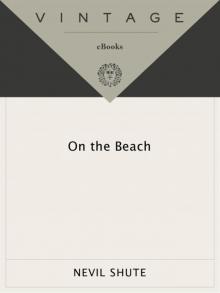 On the Beach
On the Beach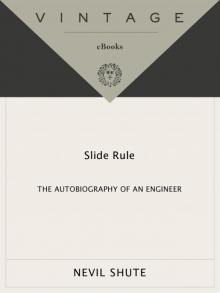 Slide Rule
Slide Rule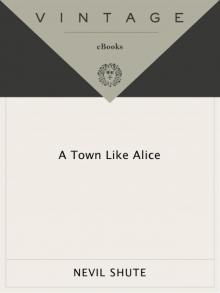 A Town Like Alice
A Town Like Alice The Far Country
The Far Country Pied Piper
Pied Piper Round the Bend
Round the Bend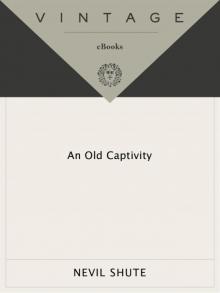 An Old Captivity
An Old Captivity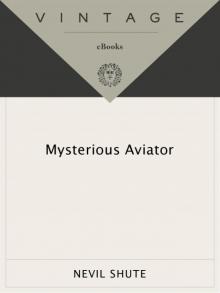 Mysterious Aviator
Mysterious Aviator The Breaking Wave
The Breaking Wave Marazan
Marazan Lonely Road
Lonely Road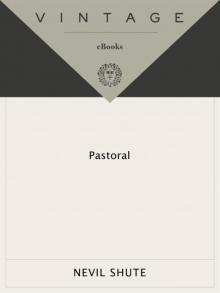 Pastoral
Pastoral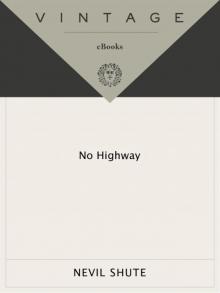 No Highway
No Highway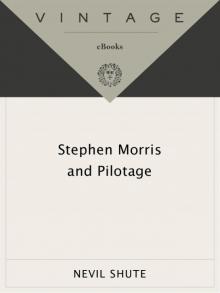 Stephen Morris and Pilotage
Stephen Morris and Pilotage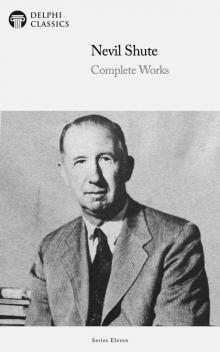 Complete Works of Nevil Shute
Complete Works of Nevil Shute Most Secret
Most Secret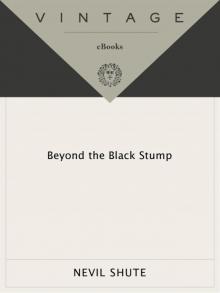 Beyond the Black Stump
Beyond the Black Stump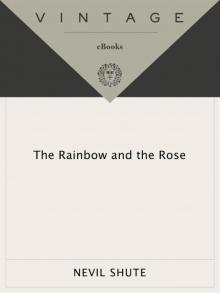 The Rainbow and the Rose
The Rainbow and the Rose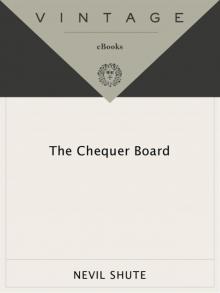 The Chequer Board
The Chequer Board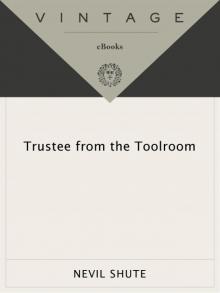 Trustee From the Toolroom
Trustee From the Toolroom Ordeal
Ordeal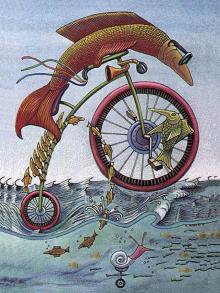 Stephen Morris
Stephen Morris